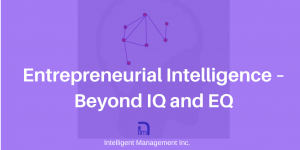
Much has been written about the importance of not just IQ but EQ, Emotional Intelligence. (Daniel Goleman explains EQ in this video.) We now know that there are different forms of human intelligence and all of us have them to differing degrees.
Why isn’t everyone an entrepreneur?
Anyone can go and register a company, but that doesn’t make them an entrepreneur. In over 25 years of working with numerous entrepreneurs, it’s become clear to us that there is something distinctive in the way an entrepreneur thinks that allows them to act independently and with success. In a situation of crisis, entrepreneurs have to leverage their ability to think differently to see new ways ahead. We might call their ability EN.Q or Entrepreneurial Intelligence. What follows are some key traits or abilities that we have observed to be features of EN.Q
What distinguishes someone with EN.Q perhaps more than anything else is the ability to see things that others simply don’t. You first have to be able to envisage what a business looks like and then accept the risk required to work towards the goal.
Making the goal happen in reality involves many aspects of Entrepreneurial Intelligence, including the ability to:
- see what it is that provides value to customers because without that goal clearly in mind there can be no longevity;
- inspire and lead others so that they contribute to make it happen, and that’s a lot more than Huckleberry Finn persuading someone to paint a fence because people have to turn up and keep turning up day after day;
- shoulder the responsibility of having people on pay roll and families that depend on that pay. This responsibility cannot be blind, either. You have to be able to discern when it is necessary to part ways with certain people if their presence and mindset put the venture in jeopardy;
- innovate because not only do you create something that wasn’t there before, but no business can carry on in the same way for years on end and survive, especially today when reality changes so fast;
- see ahead, and connect dots that others don’t because this is what allows you to seize opportunities as they arise;
- inspire trust in others, in customers first and foremost, to grant you their business, and in investors and banks to provide the support you may need along the way;
- subordinate your life to the success of the business because there are no days off for entrepreneurs;
- spend money when it is needed to allow growth instead of focusing on reducing costs.
Entrepreneurial Intelligence and sustainable prosperity
To be an entrepreneur who can grow their business in a sustainable way, you need to be able to think systemically and assess the impact of decisions and possible negative implications before they arise. Thinking systemically also means seeing very clearly that you are part of a greater value chain where all stakeholders have to benefit as this is what creates sustainability in the long run.
What about management?
We have looked at certain traits of entrepreneurial intelligence. Entrepreneurs are not necessarily the best managers and they may do well to hire others to take on the task of managing the way work is organized and how people interact to achieve the goal.
When it comes to management, it’s important to consider that today’s world is governed by complexity. Navigating complexity is like flying a plane in the dark – it requires knowledge and the right instruments. More than ever, entrepreneurs should be aware that effective management is a science. Dr. W. Edwards Deming and Dr. Eliyahu Goldratt have provided the two most significant contributions to management science in recent decades through their systemic approaches. All of our work with dozens of companies carrying out implementations of our Decalogue management methodology follows in their footsteps, both on the field and in our books and publications.
From our years of working alongside companies, we can say that any organization is at a disadvantage if it ignores the science and method connected with managing variation and managing its constraint. But as Dr. Deming put it, “Learning is not compulsory, neither is survival.”





LEARN MORE